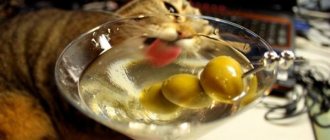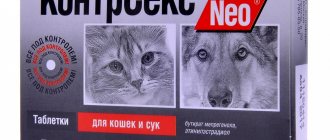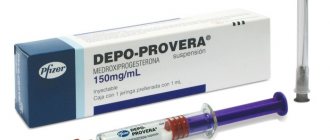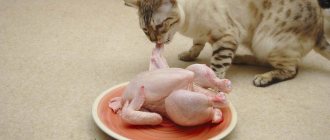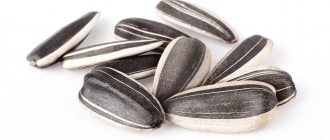6737Pavel
1
The kitten is the cheerful and cutest resident in the house. How interesting it is to watch him play, grow and become an important cat. But along the way there are a variety of obstacles in the form of nutrition and development issues. Proper nutrition for a kitten is the key to its survival and growth into a gorgeous pet. Therefore, among the usual questions, the leader invariably is: “can kittens have sour cream?”, because they lick it so funny and then lick it for a long time. Caring owners are interested in whether kittens can be fed this product, how often and at what age, so as not to cause harm.
The benefits of sour cream for cats and kittens
- Like other dairy products, sour cream is a source of calcium, amino acids, vitamins and many nutrients.
- Calcium is responsible for the proper development of the skeletal system and supports the growth and strength of teeth, nails and bones.
- Amino acids and vitamins strengthen, stabilize the functioning of the entire body, and also improve the skin and hair of your four-legged friend.
How to properly feed a cat sour cream?
- Fermented dairy products can be fed to pets on a daily basis.
- The serving for a kitten should not exceed 20 grams per day.
- Adults can be given 50-100 g of sour cream daily.
- It should be remembered that the fat content of sour cream is best adjusted to 10%.
- Sometimes it is advisable to replace this product with fermented baked milk, kefir, cottage cheese, yogurt, whey, and unsalted cheese.
- If your kitten doesn't like sour cream, you should mix it with foods that he likes.
- This is done at least twice a week.
- Sour cream can also be diluted with water.
- All food products are introduced into the diet gradually.
- When introducing a new food, you must closely monitor the animal's health and well-being.
When should a cat not eat sour cream?
- An animal that eats dry food should not eat sour cream.
- A carefully selected food composition completely saturates and provides all the necessary substances and microelements for the pet’s body, so an additional fermented milk product can cause digestive problems.
- You should not give sour cream to such cat breeds as Persian, Angora, and British.
- There is individual lactose intolerance. Plus, lactose is not digested by the digestive system. In this case, the use of milk should be completely avoided.
- In fermented milk products, a fermentation process occurs and milk sugar is converted into lactic acid. For this reason, even if you are lactose intolerant, you can consume fermented milk products.
Choose your kitten's food responsibly and carefully. It is through a balanced diet that your kitten gets all the vitamins, minerals and nutrients he needs. Thanks to professional advice, you will raise a healthy, beautiful and smart kitten.
See also: nicknames for ginger cats and male cats
List of prohibited products
The following are unacceptable in the diet of any pet, regardless of age:
| Product | Effect produced |
| Chocolate and all products containing cocoa beans | They contain theobromine, which is deadly for cats, which accumulates in the liver, does not decompose, and is not excreted from the body. |
| Alcohol, beer, hops | They are also not excreted from the cat’s body. Inadmissible even in small quantities. |
| Coffee and tea | Any products with high levels of caffeine lead to extensive damage to the cardiovascular and nervous systems. |
| Mushrooms | Lead to severe poisoning, possibly causing immediate death. |
| Potatoes and tomatoes | They contain an alkaloid that promotes severe damage to the gastrointestinal tract (of course, if eaten in large quantities). In the form of puree or juice, the latter do not cause such severe consequences, but there is also no benefit from them. |
| Avocado | Contains persin, which is toxic to the cat's body. Diarrhea, vomiting, and difficulty breathing after eating this fruit are often fatal. |
| Garlic and onion | The disulfite they contain leads to the death of red blood cells and the development of anemia. |
| Rhubarb, sorrel | When they are consumed by cats, poisoning occurs with oxalic acid. May cause kidney failure. When cooked it leads to diarrhea. |
| Stone fruit seeds | Contains hydrocyanic acid, which causes suffocation. |
| Grapes (raisins), citrus fruits, persimmons | They provoke vomiting and diarrhea. |
| Boiled meat, chicken, fish bones | May cause injury and rupture of the intestine. |
Products undesirable in the diet of animals:
- Flour containing nutritional yeast and pasta products will lead to intestinal fermentation and diarrhea.
- Nuts and sunflower seeds in large doses lead to phosphorus poisoning.
- Peas and any legumes do not pose a mortal danger, but they lead to fermentation in the intestines.
- Broccoli contains isothiocyanates that can accumulate in the body; they are acceptable in limited doses.
- Raw and condensed milk and baby formula are harmful to the body of an adult cat. Also read: Can a cat drink milk?
- Raw eggs can cause coat problems due to the enzyme avidin in their composition.
- Fish and pork are allowed in minimal quantities.
- Goose meat, duck meat, and lard due to their high fat content can cause the development of pancreatitis.
- The liver contains many active substances, their excess leads to severe digestive disorders.
- Salt causes electrolyte imbalance in the body.
- Sugar reduces immune responses and leads to diabetes.
- Dry dog food is not recommended for cats; it can cause problems with the cardiovascular system. Read why cats can't eat dog food.
- Vitamins containing iron are unacceptable for people - they lead to disruptions in the functioning of all body systems.
Fatty, spicy, salty foods, preservatives lead to diseases of the gastrointestinal tract, liver, kidneys, diarrhea and vomiting.
Vegetables: cabbage, potatoes, tomatoes
Cats are predators by nature, but there are also gastronomic perverts among them. The owners declare this with particular pride: “My Vaska eats cucumbers!” “And mine is nibbling on cabbage!” And they don’t see the problem in the fact that the cat strives for “vitamins.” After all, we consider vegetables to be healthy.
The truth is that raw tomatoes and potatoes (especially potato peelings) contain a real poison - solanine. A cat may well be poisoned by a small tomato.
A cat cannot digest any raw vegetables. With zero nutritional value for the body, they can cause severe colic and bloating.
Restrictions
When feeding cats sour cream, you should follow the norm. All fermented milk products have a soft consistency. Therefore, your pet does not need to chew this food. Frequent or constant consumption of such food leads to disturbances in the chewing functions of the jaw and the appearance of tartar. As a result, the cat may become lazy and stop eating solid food.
Some owners prefer to feed their pets prepared food. In this case, dairy products, including sour cream, cannot be introduced into the diet. This can harm the animal, since in such food all components are balanced. The amount of vitamins, minerals and nutrients is carefully calculated. Violation of these proportions, when the cat has also eaten sour cream, threatens with indigestion and stool problems.
Persian, Angora and British cats should not be given sour cream, even if they eat it with pleasure. Veterinarians claim that their delicate bodies do not cope well with this product. Diarrhea occurs and your health deteriorates greatly. It is better to replace sour cream with low-fat cottage cheese or yogurt. The one-time dose is 30 g. You can give it to your cat once a week, even if he actively and happily eats the treat.
Is it possible to give sour cream?
All fermented milk products are beneficial for cats within reasonable limits. Sour cream contains many useful substances, vitamins and amino acids. Thanks to these components, pets' fur becomes fluffy and shiny. The cat's body copes with various diseases more easily. Sour cream relieves nervousness and aggressiveness well, acting as a sedative.
You can feed cats this product, but some nuances should be observed:
- Sour cream should not be too greasy. If you use homemade sour cream, it should be diluted with whey or low-fat kefir. The consistency should not be too thick or thin to make it comfortable for your pet to lick.
- Purchased products cannot contain more than 10% fat content. Excess fats negatively affect the animal's liver and digestive system.
- You need to give a little, no more than 1-2 tsp. If the kitten licks the treat with pleasure and begs for more, you can treat it only 2 times a week.
Veterinarians remind that all food offered to your pet must be fresh. If for some reason sour cream is replaced with yogurt, cottage cheese, or simply introduced into the diet, then take products without additives and flavorings.
Onion and garlic
A cat usually does not chew garlic or onions. But some owners try to feed their pet garlic in order to destroy worms.
Onions and garlic are hidden in products - cutlets, pilaf, soup, baby food. One serving of such food will not harm the cat, but poisons (sulfur compounds) accumulate in the body, causing the destruction of red blood cells and symptoms of chronic poisoning.
The cat is attracted to meat, but if you leave a bowl with the remains of the marinade, it can eat onions soaked in juice
Sweets
Candies, chocolate, etc. should not be given to four-legged animals under any circumstances. Caffeine, theobromine and other sweet ingredients can only be absorbed by the human body. They are very toxic for cats. If you feed your pet sweets, your pet may develop kidney failure.
The actress who played Wonder Woman has a grown daughter: the spitting image of her mother
Psychic Alexander Kinzhinov predicted the future of Mikhail Efremov on Tarot cards
Delicious, simple and satisfying: recipe for navy-style green beans
In addition, most sweets contain too much sugar. It is not safe for humans either, let alone four-legged pets. Some sweets contain sweeteners. They can even cause an attack of suffocation in the animal.
Xylitol, sugar
Cats do not have a sweet tooth by nature: they have few receptors on their tongues that distinguish sweet taste. And they simply cannot digest fast carbohydrates, much less sweeteners.
A cat may eat chewing gum or candy out of curiosity.
Sweet foods lead to diabetes. Xylitol is even more insidious: it causes the release of insulin, and blood glucose levels drop sharply. This leads to seizures and coma.
Caries is nonsense, cats are not afraid of it. But absorbing sugar is not an easy task.
Cake? No, I didn’t see it!
Common Misconceptions
Regarding the way cats eat, as well as the list of products that are harmful and beneficial for animals, there are many false stereotypes in society:
- The cat does not eat foods that are spoiled or contain harmful additives. As evidence for this statement, they cite the fact that yard animals eat pasture or from garbage cans. At the same time, few people take into account the fact that the lifespan of a yard cat is only 3-5 years and one of the reasons for this duration is the quality of nutrition.
- Milk, sour cream, fish and sausages are a healthy and tasty delicacy. This stereotype is firmly ingrained in the memory thanks to numerous references to such a “menu” in folk art, books and cartoons.
- Professional food is not very healthy, so it can only be used as a supplement to natural food. Everything is exactly the opposite. Professional food from leading manufacturers contains a balanced set of all elements necessary for the normal development and functioning of an animal, which is almost impossible to achieve by choosing a diet on your own, but mixing them with natural products is undesirable - in this case, the optimal ratio of the amount of substances entering the body and the animal’s digestion are disrupted .
Sausage
For some reason, it is believed that sausage is a favorite treat for dogs and cats. But many animals refuse to eat it unless they are too hungry.
My prey!
Why is giving your cat any sausages or sausages a bad idea? It's not about soy and the by-products from which they are often made. And in spices. This includes salt, onions, garlic, and pepper. Preservatives and dyes, which the human liver can easily neutralize, can be very dangerous for a cat.
The most dangerous types of sausages are fatty ones (raw smoked). Just one piece can cause uncontrollable vomiting due to inflammation of the pancreas and stomach walls.
Benefits and harms for cats
Although there is an opinion that sour cream and milk are very useful for cats, this is not entirely true. It all depends on the volume, fat content and quantity of the product consumed. Milk and fermented milk products contain a large number of useful components:
- amino acids;
- microelements;
- fatty acid;
- lactose;
- animal protein.
Dairy products help the animal stay active.
The calcium contained in milk is the foundation for the growth and strength of bones, teeth and nails. Dairy products are a source of energy in the life and development of a kitten. Many veterinarians advise adding fermented milk products to a cat’s menu from a young age. It is recommended to give kittens milk diluted with water. Feed should be from a pipette or syringe in small portions.
For adults, preference should be given to fermented milk products. This is due to the fact that milk contains lactose. In mature cats it can cause diarrhea, colic and bloating. Such milk products as: well regulate the digestion process and increase immunity:
Chicken bones, fish heads
Often pets are thrown from the table something that is “not a pity”, for example, bones. The cat will probably eat such a treat, at his own peril and risk.
The bone can get stuck in the esophagus (and then the pet cannot be saved without surgery), injuring any part of the digestive tract with sharp edges. When eaten in large quantities, bones cause painful constipation.
Don't give your cat bones, and make sure she doesn't steal them from the trash. The same can be said about bony fish, fish heads and tails.


